![]()
St. Clair Paperweights for Sale
![]()
St. Clair Paperweights for Sale
Most of the paperweights on this page are the work of the St. Clair family of Elwood, Indiana. In fact, it has been claimed that the St. Clairs made more paperweights than any other single factory. There are some styles that were made by not only the St. Clairs, but also others including John Degenhart, so it is sometimes difficult to be sure who made a particular item unless it was signed.
Elwood had all the right elements for the glass industry, including energy (natural gas) and abundant supplies of sand. Many glass workers moved to Elwood to work in one of the five glass factories there.
The St. Clair line (as far as paperweights are concerned) started with John "Pop" St. Clair, Sr. who worked at the George MacBeth Glass Works in Elwood from around 1903 to 1938. Local natural gas production faltered in 1938 and the St. Clairs began to develop their ideas for a new business of their own. Joe did the original experimentation and the business was formally started in 1941. John, Sr. and the brothers John, Jr., Joe, Ed and Bob all participated, while another brother, Paul, did not at first. By 1944 St. Clair paperweights were being sold through Georg Jensen on Fifth Avenue in New York.
There
is no shopping cart on this website. If you would like
to purchase any of these paperweights or need more
information, please send an email to: aport@paperweights.com
| 6033 | Magnum Bob St. Clair Sulphide Dog
Paperweight. circa 1971- 1986. A wonderful
example of a St. Clair dog sulphide paperweight. The
painted brown dog sulphide is placed on a layer of large
shards of colored glass. The signature "BOB ST. CLAIR" is
hot stamped on the base. A colorful addition to any
collection of St. Clair paperweights. Sulphides Paperweights are those that contain cast objects (animals, flowers, people) made of a ceramic material that has properties similar to the surrounding glass. They are normally white, but are also sometimes colored or even painted. The objects are cast in a mold that copied or made directly from a medallion, coin or sculpture. Often the object is surrounded by a millefiori or lampwork garland, but it may also appear alone. The finest sulphides are cast in a mold made by a skilled artist. The St. Clair line (as far as paperweights are concerned) started with John "Pop" St. Clair, Sr. who worked at the George MacBeth Glass Works in Elwood from around 1903 to 1938. Local natural gas production faltered in 1938 and the St. Clairs began to develop their ideas for a new business of their own. Joe did the original experimentation and the business was formally started in 1941 in Elwood, Indiana. John, Sr. and the brothers John, Jr., Joe, Ed and Bob all participated, while another brother, Paul, did not at first. By 1944 St. Clair paperweights were being sold through Georg Jensen on Fifth Avenue in New York. Joe retired for the first time) in 1971 and sold the factory to new owners in Elwood, Indiana. About the same time, Robert St. Clair (1919 - 1986) and his wife Maude opened a new factory in Elwood. Paul St. Clair retired from General Motors and joined Bob, along with Ed St. Clair and a nephew, Joe Rice. Sometime later after Bob opened his factory, the new owners of the original factory sold the factory back to Joe. So, for a while, there were two St. Clair Glass factories. Bob St. Clair died in 1986 and Joe Rice bought his estate including Bob's factory. Joe St. Clair died in 1987. Very large size: 3 3/8" diameter by 3 1/4"
high. The base is ground flat. It weighs just over
29 ounces. For extra pictures, click on the picture at the right and the following links: Large pictureSOLD. Click on the picture to see a larger image. |
Click
on the picture to see a larger image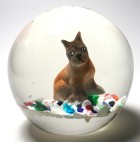 |
| 5257 | Rare Magnum Joe St. Clair Pink Crimp
Rose Paperweight with Twenty Petals. circa
1960-1980. This is a delicate pink crimp rose with twenty
petals plus a center stamen (or pistil). The petals are
arranged in Joe St. Clair's five row 4+4+4+4+4 crimp pattern and
placed over a four leaf shaped green ground. It is signed on
a polished flat base with indented letters "JOE ST CLAIR".
This may be engraved or machined rather than hot stamped.
This is a fancier signature than the hot stamped signature that
Joe used on most paperweights. A flashy paperweight with
great color and execution. Crimp roses represent the ultimate challenge for paperweight makers. You can read about the crimps and their use in making crimp roses in the book American Glass Paperweights and Their Makers by Jean Melvin (1970). The St. Clair line (as far as paperweights are concerned) started with John "Pop" St. Clair, Sr. who worked at the George MacBeth Glass Works in Elwood from around 1903 to 1938. Local natural gas production faltered in 1938 and the St. Clairs began to develop their ideas for a new business of their own. Joe St. Clair (1909 - 1987) did the original experimentation and the business was formally started in 1941 in Elwood, Indiana. John, Sr. and the brothers John, Jr., Joe, Ed and Bob all participated, while another brother, Paul, did not at first. By 1944 St. Clair paperweights were being sold through Georg Jensen on Fifth Avenue in New York. Joe retired (the first time) in 1971 and sold the factory to new owners in Elwood, Indiana. About the same time, Bob St. Clair and his wife Maude opened a new factory in Elwood. Paul St. Clair retired from General Motors and joined Bob, along with Ed St. Clair and a nephew, Joe Rice. Sometime later after Bob opened his factory, the new owners of the original factory sold the factory back to Joe. So, for a while, there were two St. Clair Glass factories. Bob St. Clair died in 1986. Joe St. Clair died in 1987. Ed St. Clair died in 1989 and the last brother, Paul St. Clair died in 2000. Very large size: Just under 3 1/2” diameter by 3
3/8” high. The base is polished flat. It weighs just
over two pounds. For extra pictures, click on the picture at the right and the following links: Large pictureSOLD. Click on the picture to see a larger image. |
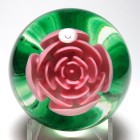 |
| 4009 | Joe St. Clair Multicolored Ribbon Crimp
Paperweight - Signed. circa 1941-2000.
Multi-colored stylized crimp flower in the unique St. Clair
style. I refer to this style as a rainbow ribbon crimp
weight. It has has eight pleats or crimps with a carefully
placed bubble between each. A showy paperweight with great
color. Very collectible. Similar examples are shown American Glass Paperweights and Their Makers by Jean Melvin (1967 and 1970) and the St. Clair Collectors Guide by Bonnie Pruitt. The St. Clair line (as far as paperweights are concerned) started with John "Pop" St. Clair, Sr. who worked at the George MacBeth Glass Works in Elwood from around 1903 to 1938. Local natural gas production faltered in 1938 and the St. Clairs began to develop their ideas for a new business of their own. Joe St. Clair (1909 - 1987) did the original experimentation and the business was formally started in 1941 in Elwood, Indiana. John, Sr. and the brothers John, Jr., Joe, Ed and Bob all participated, while another brother, Paul, did not at first. By 1944 St. Clair paperweights were being sold through Georg Jensen on Fifth Avenue in New York. Joe retired (the first time) in 1971 and sold the factory to new owners in Elwood, Indiana. Sometime later, the new owners of the original factory sold the factory back to Joe. For a while, there were two St. Clair factories, one owned by Joe and the other owned by Bob St. Clair. Large Size: Just over 2 3/4" diameter by 2"
high. The bottom is fire finished and hot stamped with the
signature. For extra pictures, click on the picture at the right and the following links: Large pictureSOLD. Click on the picture to see a larger image. |
Click on the picture
to see a larger image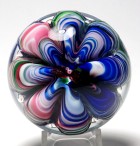 |
| 4031 | Large Maude and Bob 1976 Blue Icepick
Flower Candle Holder Paperweight. dated
1976. This large candle holder paperweight features five
light blue icepick flowers over an dark blue ground. As is
typical of the St. Clair style, there is a carefully placed bubble
in the center of each flower and also a carefully placed bubble in
the ground in between each flower. There is a ribbed handle
on one side. It is hot stamped on the base "MAUDE AND BOB ST
CLAIR 1976". Maude and Bob St. Clair produced paperweights
under their own label for less than fifteen years. A great
addition to any collection of St. Clair items. This style of flower is called an ice-pick flower because of the icepick like tool used to push each flower down to the ground to form a stem. Note: In the pictures, the handle shows a yellow color. This is a reflection from something in my work area. The handle of the candle holder is clear colorless glass. The St. Clair line (as far as paperweights are concerned) started with John "Pop" St. Clair, Sr. who worked at the George MacBeth Glass Works in Elwood from around 1903 to 1938. Local natural gas production faltered in 1938 and the St. Clairs began to develop their ideas for a new business of their own. Joe St. Clair (1909 - 1987) did the original experimentation and the business was formally started in 1941 in Elwood, Indiana. John, Sr. and the brothers John, Jr., Joe, Ed and Bob all participated, while another brother, Paul, did not at first. By 1944 St. Clair paperweights were being sold through Georg Jensen on Fifth Avenue in New York. Joe retired (the first time) in 1971 and sold the factory to new owners in Elwood, Indiana. About the same time, Bob St. Clair and his wife Maude opened a new factory in Elwood. Paul St. Clair retired from General Motors and joined Bob, along with Ed St. Clair and a nephew, Joe Rice. Sometime later after Bob opened his factory, the new owners of the original factory sold the factory back to Joe. So, for a while, there were two St. Clair Glass factories. Bob St. Clair died in 1986. Joe St. Clair died in 1987. Ed St. Clair died in 1989 and the last brother, Paul St. Clair died in 2000. Robert (Bob) St. Clair was born May 18, 1919 and passed away in 1986. He is known to have used two signatures from 1971 to 1986. Most of the time he included his wife and used the stamp "MAUDE AND BOB ST. CLAIR", often with a date with raised lettering. Less frequently, he used the stamp "BOB ST. CLAIR" with no date. This stamp, with only BOB, can be found with either raised or indented lettering.
Size: The center paperweight portion is just
under 3" diameter. With the handle and the cup for the
candle it is 4 1/16" wide by just under 3" deep by 3 1/16"
high. The base is finished flat and hot stamped in the
center with the signature. For extra pictures, click on the picture at the right and the following links: Large pictureSOLD. Click on the picture to see a larger image. |
Click on the picture
to see a larger image 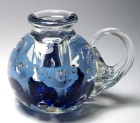 |
| 4039 | Joe Rice Magnum Multicolored Ribbon
Crimp Paperweight. circa 1987-2010.
Multi-colored stylized crimp flower in the unique St. Clair
style. I refer to this style as a rainbow ribbon crimp
weight. It has has eight pleats or crimps with a carefully
placed bubble between each. The design is off center in the
paperweight. A showy paperweight with great color.
Very collectible. Similar examples are shown American Glass Paperweights and Their Makers by Jean Melvin (1967 and 1970) and the St. Clair Collectors Guide by Bonnie Pruitt. They were made by members of the St. Clair family and also by Joe Rice. The St. Clair line (as far as paperweights are concerned) started with John "Pop" St. Clair, Sr. who worked at the George MacBeth Glass Works in Elwood from around 1903 to 1938. Local natural gas production faltered in 1938 and the St. Clairs began to develop their ideas for a new business of their own. Joe St. Clair (1909 - 1987) did the original experimentation and the business was formally started in 1941 in Elwood, Indiana. John, Sr. and the brothers John, Jr., Joe, Ed and Bob all participated, while another brother, Paul, did not at first. By 1944 St. Clair paperweights were being sold through Georg Jensen on Fifth Avenue in New York. Joe retired (the first time) in 1971 and sold the factory to new owners in Elwood, Indiana. Sometime later, the new owners of the original factory sold the factory back to Joe. For a while, there were two St. Clair factories, one owned by Joe and the other owned by Bob St. Clair. Joe Rice,a third generation
glassblower in the St. Clair family, is the grandson of John
"Pop" St. Clair, Sr. and nephew of a nephew of
Joe St. Clair and the other brothers mentioned above.
His mother Jane Rice was Joe St. Clair's sister. Joe
Rice began working at the family glass factory in 1962 at the
age of twelve. He worked with his uncles Joe, Ed, Bob,
and Paul after school hours and during the summer
months. When the estate of Bob St. Clair was ready for
public auction in October 1987, Joe Rice was able to purchase
the property along with needed supplies and equipment.
He reopened the factory as the The House of Glass. His
uncles Ed and Paul were there to help guide him along his path
to success. The House of Glass continues to operate in
Elwood, Indiana. Very large size: Just under 3 7/8" diameter by 2
3/8" high. The bottom is fire finished and hot stamped
with the signature. The paperweight weighs 29
ounces. For extra pictures, click on the picture at the right and the following links: Large pictureSOLD. Click on the picture to see a larger image. |
Click on the picture
to see a larger image 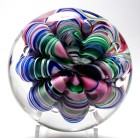 |
| 5185 | Large Joe St. Clair Icepick Flower
Teapot Ring Holder Paperweight. circa 1960 -
1980. This teapot shaped figural paperweight is intended for
use as a ring holder and is a very popular design. It has
five light blue icepick flowers over a white chipped glass
ground. As is typical of this style, there is a carefully
placed bubble in the center of each flower and also a carefully
placed bubble in the ground in between each pair of flowers.
It is hot stamped "JOE ST CLAIR" on the bottom. A very
flashy figural paperweight.
This style of flower is called an icepick flower because of the ice-pick like tool used to push each flower down to the ground to form a stem.
The St. Clair line (as far as paperweights are concerned) started with John "Pop" St. Clair, Sr. who worked at the George MacBeth Glass Works in Elwood from around 1903 to 1938. Local natural gas production faltered in 1938 and the St. Clairs began to develop their ideas for a new business of their own. Joe St. Clair (1909 - 1987) did the original experimentation and the business was formally started in 1941 in Elwood, Indiana. John, Sr. and the brothers John, Jr., Joe, Ed and Bob all participated, while another brother, Paul, did not at first. By 1944 St. Clair paperweights were being sold through the Georg Jensen Shop on Fifth Avenue in New York. Joe retired (the first time) in 1971 and sold the factory to new owners in Elwood, Indiana. Sometime later, the new owners of the original factory sold the factory back to Joe. For a while, there were two St. Clair factories, one owned by Joe and the other owned by Bob St. Clair. Size: 4 7/8" wide by 4" high. The
center paperweight portion is 2 1/2" in diameter. The bottom is
finished flat and hot stamped in the center with the
signature. For extra pictures, click on the picture at the right and the following links: Large pictureSOLD. Click on the picture to see a larger image. |
Click
on the picture to see a larger image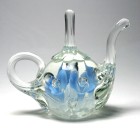 |
| 2111 | Rare Miniature Rose Stopper -
Possibly St. Clair. c.1950. This is a miniature
red crimp rose intended to be a perfume stopper or perhaps a
lady's gearshift knob. There are 16 deep red petals and four
translucent green leaves. The paperweight end is faceted
with four side facets plus a top facet. The facets are
angled so that the top is slightly smaller than the bottom.
The stem is unfinished.
I don't know who made this miniature crimp rose, but the setup matches one attributed to St. Clair by Melvin in the book American Glass Paperweights and their Makers (revised edition 1970). If you have that book, check out the sixth color page between pages 48 and 49. In the middle group of paperweights on that page, there is a pink rose with the same setup (between two star shaped paperweights). The attribution may be incorrect. Miniature Size: 1 1/2" diameter by 1 2/3" high. With the
facets the top is slightly rectangular 1 1/8" by 1 1/4".
The paperweight portion just over 3/4" high. Click on the picture to see a larger image. |
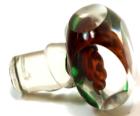 |
| 4326 | Magnum Joe St. Clair Pink and White
Icepick Flower Paperweight. circa 1960-1970.
This very large paperweight features five pink and white ice-pick
flowers over a white frit ground. As is typical of this
style, there is a carefully placed bubble in the center of each
flower and also a carefully placed bubble in the ground in between
each flower. It is hot stamped "JOE ST CLAIR" on the
bottom. A very flashy paperweight. This style of flower is called an ice-pick flower because of the ice-pick like tool used to push each flower down to the ground to form a stem. The St. Clair line (as far as paperweights are concerned) started with John "Pop" St. Clair, Sr. who worked at the George MacBeth Glass Works in Elwood from around 1903 to 1938. Local natural gas production faltered in 1938 and the St. Clairs began to develop their ideas for a new business of their own. Joe St. Clair (1909 - 1987) did the original experimentation and the business was formally started in 1941 in Elwood, Indiana. John, Sr. and the brothers John, Jr., Joe, Ed and Bob all participated, while another brother, Paul, did not at first. By 1944 St. Clair paperweights were being sold through Georg Jensen on Fifth Avenue in New York. Joe retired (the first time) in 1971 and sold the factory to new owners in Elwood, Indiana. About the same time, Bob St. Clair and his wife Maude opened a new factory in Elwood. Paul St. Clair retired from General Motors and joined Bob, along with Ed St. Clair and a nephew, Joe Rice. Sometime later after Bob opened his factory, the new owners of the original factory sold the factory back to Joe. So, for a while, there were two St. Clair Glass factories. Bob St. Clair died in 1986. Joe St. Clair died in 1987. Ed St. Clair died in 1989 and the last brother, Paul St. Clair died in 2000. Very large size: 3 11/16" diameter by 2 9/16"
high. It weighs over 28 ounces and will be over two pounds
when packaged. The base is finished flat and hot stamped
in the center with the signature. For extra pictures, click on the picture at the right and the following links: Large pictureSOLD. Click on the picture to see a larger image. |
Click
on the picture to see a larger image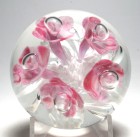 |
| 4473 | Large Joe St. Clair Multi-Color Ribbon Crimp
Turtle Paperweight. circa
1970-1987. This is a large Joe St. Clair figural turtle
with a multi-colored ribbon crimp flower in the center.
There are eight pleats or crimps with carefully placed
bubbles between each. The
turtle has a round shell, four legs, a head, and a tail all of
clear glass. The signature "JOE ST CLAIR" is hot stamped
on the base. A great example. Note on condition: This paperweight has a 1/8" flaw shown in the pictures. This may be an internal fracture or it may just be some striations in the glass. No other flaws found on inspection. The St. Clair line (as far as paperweights are concerned) started with John "Pop" St. Clair, Sr. who worked at the George MacBeth Glass Works in Elwood from around 1903 to 1938. Local natural gas production faltered in 1938 and the St. Clairs began to develop their ideas for a new business of their own. Joe St. Clair did the original experimentation and the business was formally started in 1941 in Elwood, Indiana. John, Sr. and the brothers John, Jr., Joe, Ed and Bob all participated, while another brother, Paul, did not at first. By 1944 St. Clair paperweights were being sold through Georg Jensen on Fifth Avenue in New York. Joe retired for the first time in 1971 and sold the factory to new owners in Elwood, Indiana. About the same time, Bob St. Clair and his wife Maude opened a new factory in Elwood. Paul St. Clair retired from General Motors and joined Bob, along with Ed St. Clair and a nephew, Joe Rice. Sometime later after Bob opened his factory, the new owners of the original factory sold the factory back to Joe. So, for a while, there were two St. Clair Glass factories. Joe St. Clair died in 1987. Large
Size: The turtle is
approximately 7" long by 4" wide by about 1 1/2" high. The
base is hot stamped with the Joe St. Clair hot stamp
signature. For extra pictures, click on the picture at the right and the following links: Large pictureSOLD. Click on the picture to see a larger image. |
Click
on the picture to see a larger image |
| 4475 | Large Joe St. Clair Sulphide Paperweight of
Little Red Riding Hood and the Wolf. circa
1970-1987. This large Joe St. Clair has a painted sulphide
of Little Red Riding Hood and her encounter with the Wolf in the
woods. Little Red Riding Hood is carrying a basket of
goodies. There is a green tree in the background.
The sulphide is placed on a pleated transparent green
ground. The
signature "JOE ST CLAIR" is hot stamped on the base. A
wonderful example. Sulphides Paperweights are those that contain cast objects (animals, flowers, people) made of a ceramic material that has properties similar to the surrounding glass. They are normally white, but are also sometimes colored or even painted. The objects are cast in a mold that copied or made directly from a medallion, coin or sculpture. Often the object is surrounded by a millefiori or lampwork garland, but it may also appear alone. The finest sulphides are cast in a mold made by a skilled artist. The St. Clair line (as far as paperweights are concerned) started with John "Pop" St. Clair, Sr. who worked at the George MacBeth Glass Works in Elwood from around 1903 to 1938. Local natural gas production faltered in 1938 and the St. Clairs began to develop their ideas for a new business of their own. Joe St. Clair did the original experimentation and the business was formally started in 1941 in Elwood, Indiana. John, Sr. and the brothers John, Jr., Joe, Ed and Bob all participated, while another brother, Paul, did not at first. By 1944 St. Clair paperweights were being sold through Georg Jensen on Fifth Avenue in New York. Joe retired for the first time in 1971 and sold the factory to new owners in Elwood, Indiana. About the same time, Bob St. Clair and his wife Maude opened a new factory in Elwood. Paul St. Clair retired from General Motors and joined Bob, along with Ed St. Clair and a nephew, Joe Rice. Sometime later after Bob opened his factory, the new owners of the original factory sold the factory back to Joe. So, for a while, there were two St. Clair Glass factories. Joe St. Clair died in 1987. Large
size: 3 1/8" diameter by 2 5/16"
high. The base is fire finished and signed with a Joe St.
Clair hot stamp signature. For extra pictures, click on the picture at the right and the following links: Large pictureSOLD. Click on the picture to see a larger image. |
Click
on the picture to see a larger image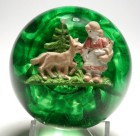 |
| 4469 | Magnum Maude and Bob St. Clair Sulphide
Turtle Paperweight. dated 1976. A wonderful
example of a St. Clair turtle sulphide paperweight.
The painted turtle is on top of a multi-colored hill of frit or
shards of colored glass. There are six valleys or pleats in
the hill, each with a carefully placed bubble at the base.
The signature "MAUDE AND BOB ST. CLAIR 1976" is hot stamped on the
base. A colorful addition to any collection of St. Clair
paperweights. Note on the date: The date on this paperweight might look like 1970, but I've concluded that it is 1976 until told otherwise. The six is slightly deformed. Bob and Maude didn't start to build their factory until Joe St. Clair retired the first time in 1971. Sulphides Paperweights are those that contain cast objects (animals, flowers, people) made of a ceramic material that has properties similar to the surrounding glass. They are normally white, but are also sometimes colored or even painted. The objects are cast in a mold that copied or made directly from a medallion, coin or sculpture. Often the object is surrounded by a millefiori or lampwork garland, but it may also appear alone. The finest sulphides are cast in a mold made by a skilled artist. The St. Clair line (as far as paperweights are concerned) started with John "Pop" St. Clair, Sr. who worked at the George MacBeth Glass Works in Elwood from around 1903 to 1938. Local natural gas production faltered in 1938 and the St. Clairs began to develop their ideas for a new business of their own. Joe did the original experimentation and the business was formally started in 1941 in Elwood, Indiana. John, Sr. and the brothers John, Jr., Joe, Ed and Bob all participated, while another brother, Paul, did not at first. By 1944 St. Clair paperweights were being sold through Georg Jensen on Fifth Avenue in New York. Joe retired for the first time) in 1971 and sold the factory to new owners in Elwood, Indiana. About the same time, Bob St. Clair and his wife Maude opened a new factory in Elwood. Paul St. Clair retired from General Motors and joined Bob, along with Ed St. Clair and a nephew, Joe Rice. Sometime later after Bob opened his factory, the new owners of the original factory sold the factory back to Joe. So, for a while, there were two St. Clair Glass factories. Joe St. Clair died in 1987. Very large size: Just over 3 1/2" diameter by 3
1/16" high. The base is ground flat. It weighs 30
ounces. For extra pictures, click on the picture at the right and the following links: Large pictureSOLD. Click on the picture to see a larger image. |
Click
on the picture to see a larger image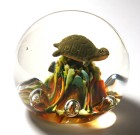 |
Back to Allan's Paperweights (www.paperweights.com)
Revised 1/3/2024 ei9